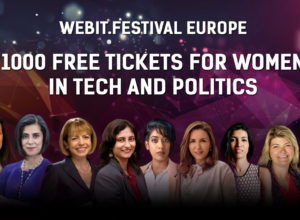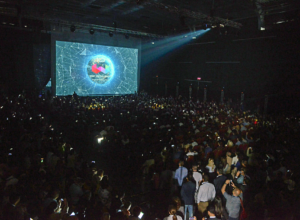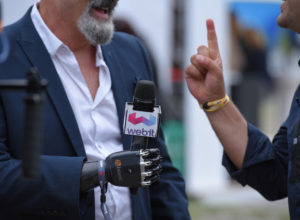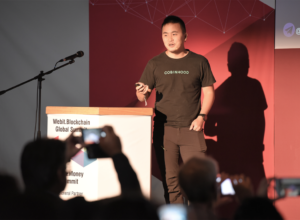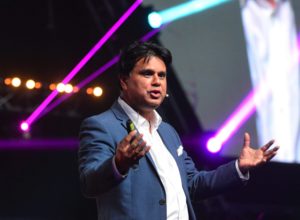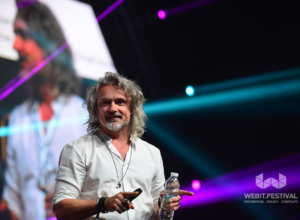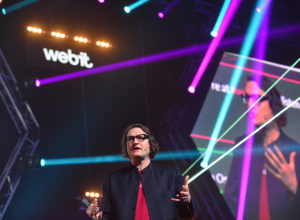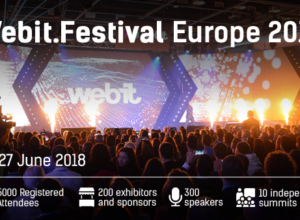Tag: webit.festival
Understanding Gigabit society and the priorities ot Infrastructure 4.0
1000 free tickets to Webit.Festival for Women in Tech & Politics
APPLY OR NOMINATE A FEMALE FRIEND FOR A FREE TICKET*
*you pay only 10% of the ticket price and it goes as donation for tickets for disadvantaged women.
What to expect from the digital transformation in 2019
The world is advancing in its digital transformation process
Being innovative and decisive, persistently driving the change, will be basic traits for any organization planning to stay competitive and live up to the expectations of our technologically thriving world. The 2019 DXC Global Digital Enterprise Survey, written by The Economist Intelligence Unit (EIU) and sponsored by DXC and Leading Edge Forum suggests that this will be “a year of decision-making and profound change”. This statement supports Diana Stefanova’s (Managing Director EMEA R&D VMware) views on digital transformation shared on the stage of Webit 2018: “Companies have to constantly innovate. If companies do not disrupt themselves, they will be disrupted by others.”
Join Webit 2019 to hear more about current technological trends and how businesses cope with them
This statement supports Diana Stefanova’s (Managing Director EMEA R&D VMware) views on digital transformation shared on the stage of Webit 2018: “Companies have to constantly innovate. If companies do not disrupt themselves, they will be disrupted by others.”
Join Webit 2019 to hear more about current technological trends and how businesses cope with them
Surveying more than 600 executives on their strategies for digital transformation
EIU reveals that the majority of businesses (over 80%) plan to increase their 2019 investments in digital technology. As numbers suggest this is by far not a hazard as 70% of the respondents confirm that organization’s profitability has increased thanks to their digital strategy. Investments in cloud computing, mobile and applications are already considered entangled to modern business, so exploring emerging technologies such as artificial intelligence, machine learning, server less computing and others, could lead to greater agility and competitive advantage. On the matter, 75% of respondents state that a modern IT infrastructure positions their organization to produce stakeholder value.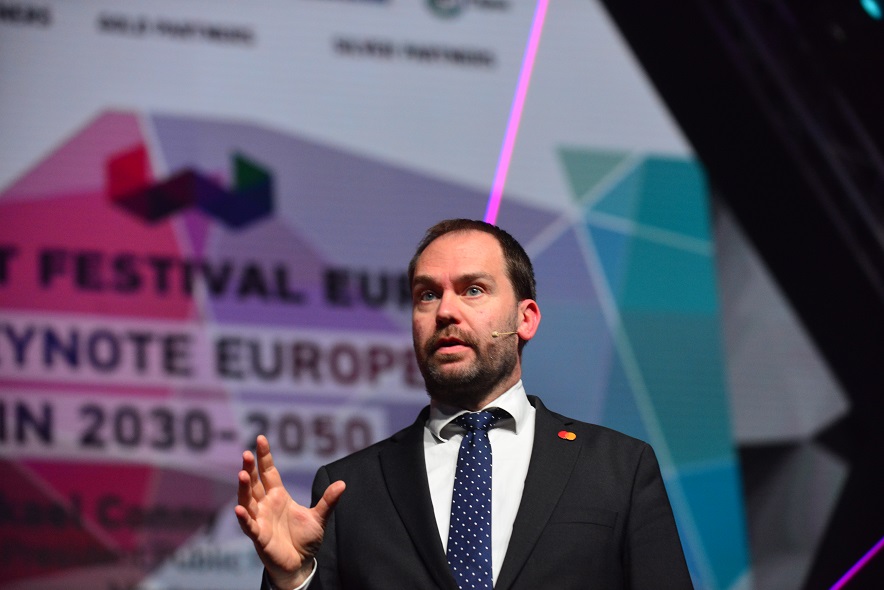 On the stage of Webit 2018 we also welcomed Mikael Conny Svensson - Vice-President Government Affairs & Public Policy, Mastercard Europe, who shared his vision for Europe in 2030-2050: “Innovation is absolutely necessary, not just to do business now, but to do it in the future too”
Explore the report and find more interesting insights here
By uniting data and analysis, an organization confidently adds value to its strategy and its further implementation, however, the adoption pace is still rather imperceptive. Only less than 30% of the organizations see their business units as “digitally enabled.” Thus, fundamental to a successful digital transformation is adequate cultural transformation. About 40% of respondents state that the process should be supported by significant initiatives related to organizational change, new recruitment and training programs, digital task forces activation, as well as strong understanding and commitment from core executives to keep and guide the “digi course”.
On the stage of Webit 2018 we also welcomed Mikael Conny Svensson - Vice-President Government Affairs & Public Policy, Mastercard Europe, who shared his vision for Europe in 2030-2050: “Innovation is absolutely necessary, not just to do business now, but to do it in the future too”
Explore the report and find more interesting insights here
By uniting data and analysis, an organization confidently adds value to its strategy and its further implementation, however, the adoption pace is still rather imperceptive. Only less than 30% of the organizations see their business units as “digitally enabled.” Thus, fundamental to a successful digital transformation is adequate cultural transformation. About 40% of respondents state that the process should be supported by significant initiatives related to organizational change, new recruitment and training programs, digital task forces activation, as well as strong understanding and commitment from core executives to keep and guide the “digi course”.
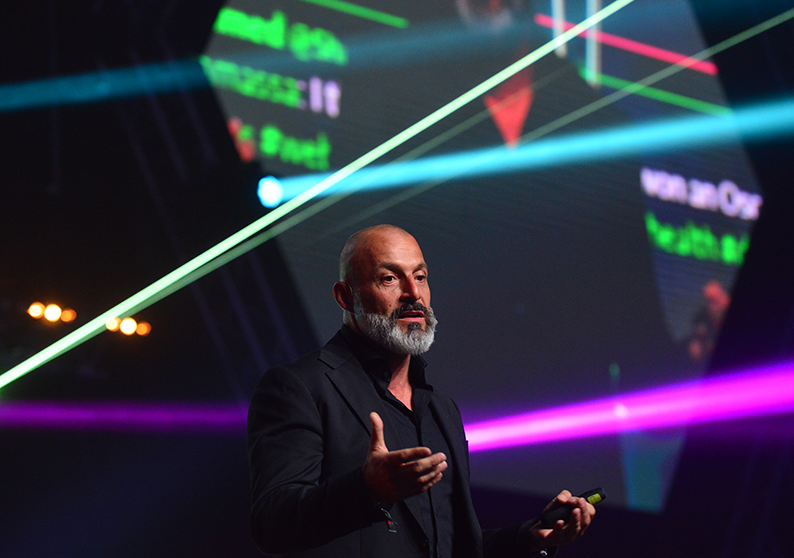 As Igor Beuker, a professional speaker, serial entrepreneur and Angel Investor shared his thoughts on innovation at our 10th birthday: “Innovation is a culture, not a department!”
Get the chance to hear about it,first hand experience at Webit.Festival Europe 2019, where attendance is 75% C-level.
Evolving and moving forward to the digitization of the business has been proven to be a strategic benefit to any organization. So, if for any reason you still doubt the value of digitizing your company or industry, come to Sofia - the digital capital and get insights from the people implementing this transformation worldwide.
Like what you read? Subscribe here and never miss Webit news and special promotions!
As Igor Beuker, a professional speaker, serial entrepreneur and Angel Investor shared his thoughts on innovation at our 10th birthday: “Innovation is a culture, not a department!”
Get the chance to hear about it,first hand experience at Webit.Festival Europe 2019, where attendance is 75% C-level.
Evolving and moving forward to the digitization of the business has been proven to be a strategic benefit to any organization. So, if for any reason you still doubt the value of digitizing your company or industry, come to Sofia - the digital capital and get insights from the people implementing this transformation worldwide.
Like what you read? Subscribe here and never miss Webit news and special promotions! Webit.Festival Europe 2019 Official Trailer!
The DApps Era is coming – the future of Blockchain adoption
The DApps Era is coming
Back in 1991, many of you remember when the websites obsession was huge - the largest companies began with it. The transition towards search engines like Google and Yahoo was more or less smooth until they became viral. The appearance of sharing platforms appeared naturally - youtube, myspace, blogspots, etc. Some of the platforms disrupted and stayed, others disappeared and many, many more appeared. A couple of years ago Messenger,whatsapp and instagram, to name a few - everybody talked about these and while they’re widely used today, the hype over them disappeared. In 2017 - 2018 the most talked about technology advancements are the crypto-blockchain platforms. We are, very naturally, transitioning towards DApps era - or post apps era, role of apps is increasing and becoming more important rather than steady. All of this transition may seem ‘natural’, however, appearance and longevity process is way more difficult. Geoffrey A. Moore’s “Crossing the Chasm” theory applies to basically any sphere. Hsuan explained the technology adoption cycle in the following way: The innovators are about 2,5 % of all the population. The heart of all high tech startups is a product that spawned from a small group of passionate scientists.The early adopters take up about 13,5 %.
This is the ‘chasm’ to which companies pay little attention to once a company is over hyped by the success of market entry. This is the worst place to be, characterized by low scalability, high transaction latency and high transaction fees. The early (34%) and late (34%) majority are the largest part and the most secure phases in a company's development. There are, however, cases when the company fails - the ‘laggards’ as Hsuan calls them - are about 16% of all. Blockchain adoption by companies will be as difficult process as the transition from appearance of apps to their everyday viral usage. It will happen, however.Missed the 2018 edition of Webit.Festival Europe? Don’t miss the 2019! Get your super early bird 2in1 tickets – 2 for the price of 1 here!
The future of Health at Webit.Festival Europe 2018
Health is so important to all of us, it requires change. How do we create a better future for all of us?
In healthcare around the world there's change in quality, sometimes poor access. How do we enable technology to deliver the things that we all aspire? - to make healthcare free for all at a high quality. That's the role of Health.Summit chaired by prof. Shafi Ahmed. Medicine is the perfect example of how the fourth industrial revolution is changing all of us.What about Europe?
We need data and insights on the health of European citizens, on how we organize care, and on how much our health systems cost. The EC joined forces with the OECD and the Observatory on Health Systems and Policies, and analyzed each EU country. The reports show that our healthcare needs to be more effective, accessible and resilient. For example, 80% of healthcare costs are spent on treating chronic diseases, but just a fraction on prevention. Shifting on prevention not only tackles inequalities in health and quality of life, but also offers an enormous economic return. Today, one in four patients have no access to a family doctor or a local health center, and have to go to an emergency department. With available and affordable primary care we can avoid unnecessary hospital admissions. Too often patients are searching for the best possible treatment in a maze of scattered health services. Integrated care, where all care providers work more closely together delivers better results for patients. "The state of Health" in the EU links the strengths and challenges in the different European countries to common health priorities across the EU. The reports help policymakers make relevant and efficient choices so all of us can enjoy a healthy future.Teaching tens of thousands of people together to improve the education resources.
As a global surgeon prof. Shafi Ahmed thinks about how to scale the learning and education around the world. Now we are connected with cables, by phones and satellites. And because we are connected now we can reach far more. We have social media to connect with people. We are changing the paradigm of the doctor-patient relationship using AI, chat bots, deep machine learning, avatars and holograms. In the next 2-5 years we are going to communicate in a different way. The human interaction will little bit disappear because it is too expensive.
I thought "How can I connect with people around the world? Let's connect my avatar with other avatars in America, in India. Can they come to my theater together in this virtual space? They call me the Virtual Surgeon.
[embed]https://www.youtube.com/watch?v=-4T49_zz3HA[/embed]
Imagine someone operating on the other side of the globe, calling you and saying: "I need some advice, can you come?" Plane travel - too long, inefficient. What about transporting yourself as a hologram?
Shafi Ahmed has been spending a lot of time talking about how we use technologies in a way that we haven't done before. And at Webit.Festival Europe 2018 he announced that he and Mr. Martin Dockweiler are launching the first digital hospital in South America. The hospital will be called SAMD (Shafi Ahmed Martin Dockweiler) University Hospital. It will have a center of innovation, research, teaching. They will be testing new technologies.
The future is not today or tomorrow. It's happening all around us as we speak. And that is the future we create for ourselves.Missed the 2018 edition of Webit.Festival Europe? Don’t miss the 2019! Get your super early bird 2in1 tickets – 2 for the price of 1 here!
Martin Wezowski talks about “WTF – What’s the future” @Webit.Festival 2018
"The future is very important, because we will kind of spend the rest of our lives there. So we better make it really good. :)"
Martin Wezowski is the Chief Designer & Futurist at SAP. He joined Webit to put some perspective on “what is work and what is human in a superhuman future”.Martin, being a fan of the Beatles, started with playing a tune that resembles the style of the iconic band. But later he revealed that the song was created by AI that mimics the Beatles.
"It listens to everything that The Beatles have ever done and makes new songs. It does it so successfully that it has over 2M views on Youtube. That should really raise deep and profound questions."
The main question is WTF - What’s the future?
One example of that is the healthcare."It takes 7-10 years to make a doctor, which gives us a severe shortage of doctors."
With the soon-future-AI, medical help will be in infinite amount everywhere, all the time for everyone. That should also change our minds about what is human work. Nowadays AI can diagnose heart diseases or lung diseases more accurately than humans. Funny enough, humans and AI combined are almost 100% correct. In the 90s we decoded the human genome. It took billions of dollars. Now there is a DNA sequencer for 1000$. What does this mean for research? What does it mean for animal testing?The NOW has never been so temporary as it is today.
Maybe we should start imagining the futures that we want and start creating them, rather than react to what we where we are today because thus we are too late. That might be a little scary because we see jobs disappearing. A hundred years ago almost everybody worked at farming, fishing, forestry. Now it's only about 2%. What did they do? What would they think if you'd tell them: "Most of you will not be in agriculture." What would hey imagine that they will do, accounting? Web development? We are in the same situation today. And it doesn't matter because we will imagine new jobs as they emerge. We can't plan for it. And the real question is this:What to teach kids to become relevant in 30 years from now?
How can we adapt to the change? What new values do we need? The stability of planning is a little bit of fake. The opposite to stability is not instability, it's emergence. It's risk, it's rock'n'roll. To transform, to challenge and take risks. Innovation is sort of rock'n'roll in business and we need more of that.One thing we rely on is the thinking of the 3 horizons.
- Continuous innovation - Ready to consume: Traditional KPIs (key performance indicators) of predictable outcomes and repeatable results and scalable efficiency.
- Adjacent innovation - Ready to Co-innovate: Forecasting your intelligence and resources to the near future, the next, the adjacent innovation where you co-innovate with your partners and/or customers.
- Transformative Innovation - Ready to Inspire: Thinking away from what you can do today and the tools you have. Your vision and thought leadership leads to ideas that you must articulate very clearly so you can have a decent discussion on executive and board level about these ideas.
Help the world run better and improve people's lives.
These two things go to the two sides of the spectrum with 4 dimensions:- The self running company
- Self organizing Business Ecosystems
- Augmented humans
- Purpose Led New Market & Business Models
“Everything from the beginning is an open end and it's up yo us to actually sit down and actually use this methods and look across all the 3 horizons, articulate futures that are desirable where we can play a significant positive role. That's our purpose. And if we do that I actually think we can design futures that we all want to live in. And we should remember to have some fun as well. :)”
Missed the 2018 edition of Webit.Festival Europe? Don’t miss the 2019! Get your super early bird 2in1 tickets – 2 for the price of 1 here!
Rob Wolcott on “Innovating your life” at Webit.Festival Europe 2018
The human experience will change more in the next century than it has in the last ten millennia: Where is the discussion to accompany that change?
Mr. Wolcott returned to Sofia once again for the 10th anniversary edition of the Festival and wowed the audience with his keynote with special topic "Innovating your life". He started with a quote from the one and only Steve Jobs:
If your aspiration is to be a leader, to make mark, to create a legacy in some way than it's going to require doing something different. If you don't you're doing the same thing that everybody else already did. And how would that distinguish you? In Robert's opinion over the next 100 years the human experience will change more than it has in the past 10 000! We will be able to solve challenges that have been intractable for centuries but we will also create threads, some of which humanity has never seen before. But unfortunately our public dialog just isn't up to the task. On the one hand we hear ''The robots will steal our jobs and then kill us all in some kind of impending robot apocalypse". But on the other some people are espousing a coming technology infused nirvana. Clearly the truth is somewhere in the vast between and it's our responsibility to explore it for ourselves. The professor broke down the immense and complicated process of "innovating our life" in 5 simple steps:
"Innovation distinguishes the leaders from the followers."
1. Always keep the mission in mind. What are you doing and how are you doing it?
When we stay focused on our dreams and give them new names like GOALS of MISSIONS they automatically become more realistic and more achievable.2. Ask better questions. We only see the things which we are looking for.
We start asking questions, we start looking for new things, for new clues. Clues that will help us get to the next step, but some of them will inevitably mislead us and we will make mistakes. Then comes the next lesson.3. Seek wisdom in mistakes. The very first reaction when something goes wrong is that we are trying to hide it.
The problem is when something doesn't go the way you expect it perhaps there's a problem with the way you see the world. Back in the late 19th century two researchers named Michelson and Morley did one of the most famous failed experiment in history. They were attempting to prove the existence of the "luminiferous aether". It was the dominant hypothesis of physics in the 19th century to explain the following phenomenon.Sound cannot travel through a vacuum because there's nothing for sound to travel through. Light however, can travel through a vacuum thus there must be something in the vacuum we cannot see.
The scientists did their experiment and when it failed, they couldn't figure out why. They changed the method, tried again, then other scientists tried again but it kept failing and nobody could figure out why. Then came Einstein who said: "Perhaps there's no problem with the experiment, perhaps there's a problem with the way we see the Universe." So when something doesn't go the way you expect it, you should step back and do an after action review: Why that did not work? What can we learn from it?
4. Create option paths. Yes, options come at a cost, but create some.
"As we each create our own paths, we together create the future." - says Mr. Wolcott - and he also adds the question to the public - "On which paths are you … and why?"5. Above all seek meaning. Human beings grow through challenges.
The question for each of us is, as lifespans increase up to even beyond a 100 years, as we encounter the remainder of 21st century, we will all be faced with the question: how should we use this time?"Missed the 2018 edition of Webit.Festival Europe? Don’t miss the 2019! Get your super early bird 2in1 tickets – 2 for the price of 1 here!
Chairman of Huawei joins Webit.Festival 2018!
More global leaders join Webit.Festival Europe 2018!
With over 75% senior attendance among the 6000 people audience from 110 countries - the speakers can only be global leaders and shapers! Join Webit.Festival Europe to meet with them, including Mr. Liang Hua, the newly elected Chairman of Huawei - the world-leading telecommunications provider, just over $90 billion in global annual sales in 2017, Huawei is also the world’s third largest smartphone seller.STILL NOT TOO LATE!
Join the Festival and explore unparalleled business networking
A warm welcome to Thibaut Gregoire, General Counsel, Europe, MasterCard, who joins along with his colleagues - both Vice-Presidents - Mikael Svensson and Louise Holden after the President of Mastercard Europe Javier Perez already joined Webit. Presenting you some of the newly announced speakers of the upcoming Europe's tech, digital economy and policy event for 2018 - Webit.Festival!
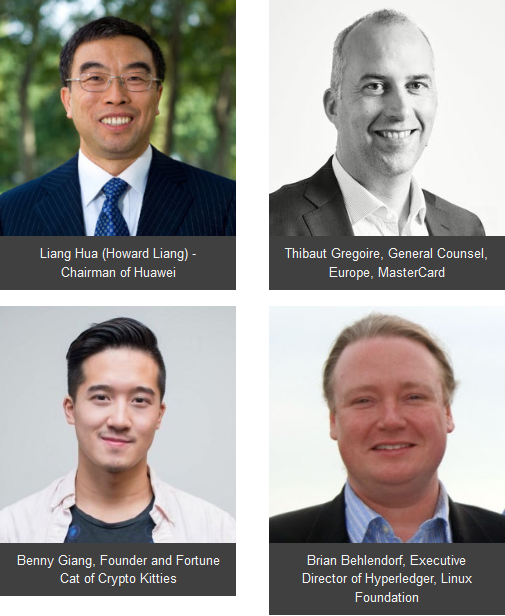 The Blockchain world joins Webit to challenge the future of the decentralized economy! Webit.Festival is the place to involve policy makers, all major tech companies and the blockchain ecosystem to innovate through collaboration!
The Blockchain world joins Webit to challenge the future of the decentralized economy! Webit.Festival is the place to involve policy makers, all major tech companies and the blockchain ecosystem to innovate through collaboration!
 With over 200 exhibitors and sponsors the 10th Webit.Festival is the largest ever European edition, double in size compared to last year.
A warm welcome to Huawei, Red Bull, Google, Amatas, Cogni, Jelurida among the newly joined sponsors and exhibitors of Webit.Fetsival 2018.
With over 200 exhibitors and sponsors the 10th Webit.Festival is the largest ever European edition, double in size compared to last year.
A warm welcome to Huawei, Red Bull, Google, Amatas, Cogni, Jelurida among the newly joined sponsors and exhibitors of Webit.Fetsival 2018.
Interested in exhibiting / sponsoring? Contact us asap!
See you on 26-27 June in Sofia! The Webit Team

